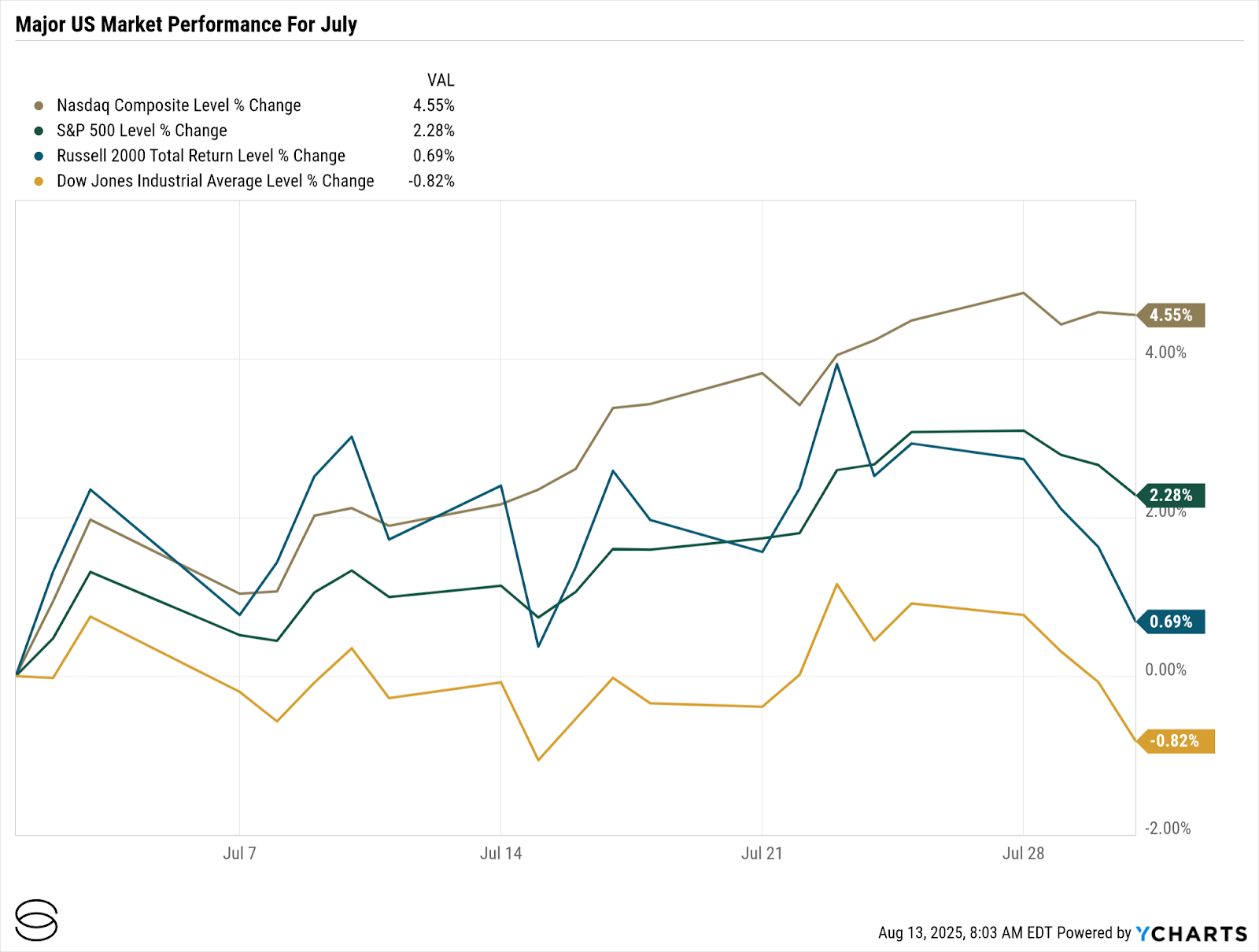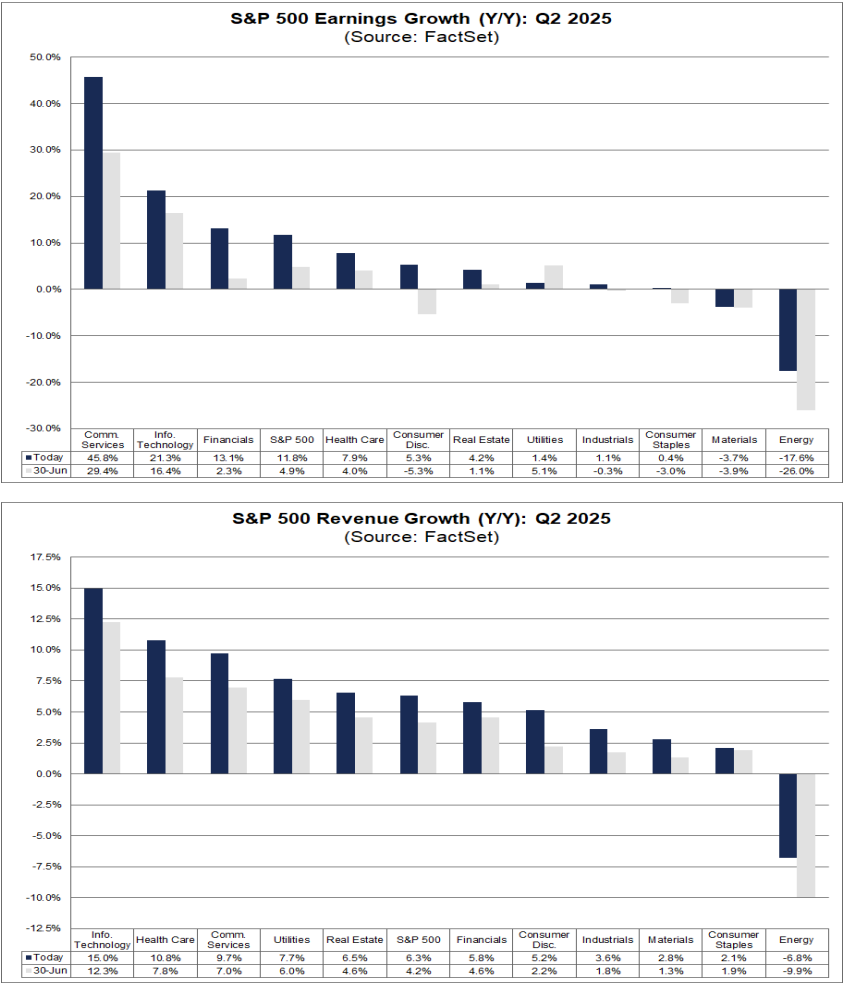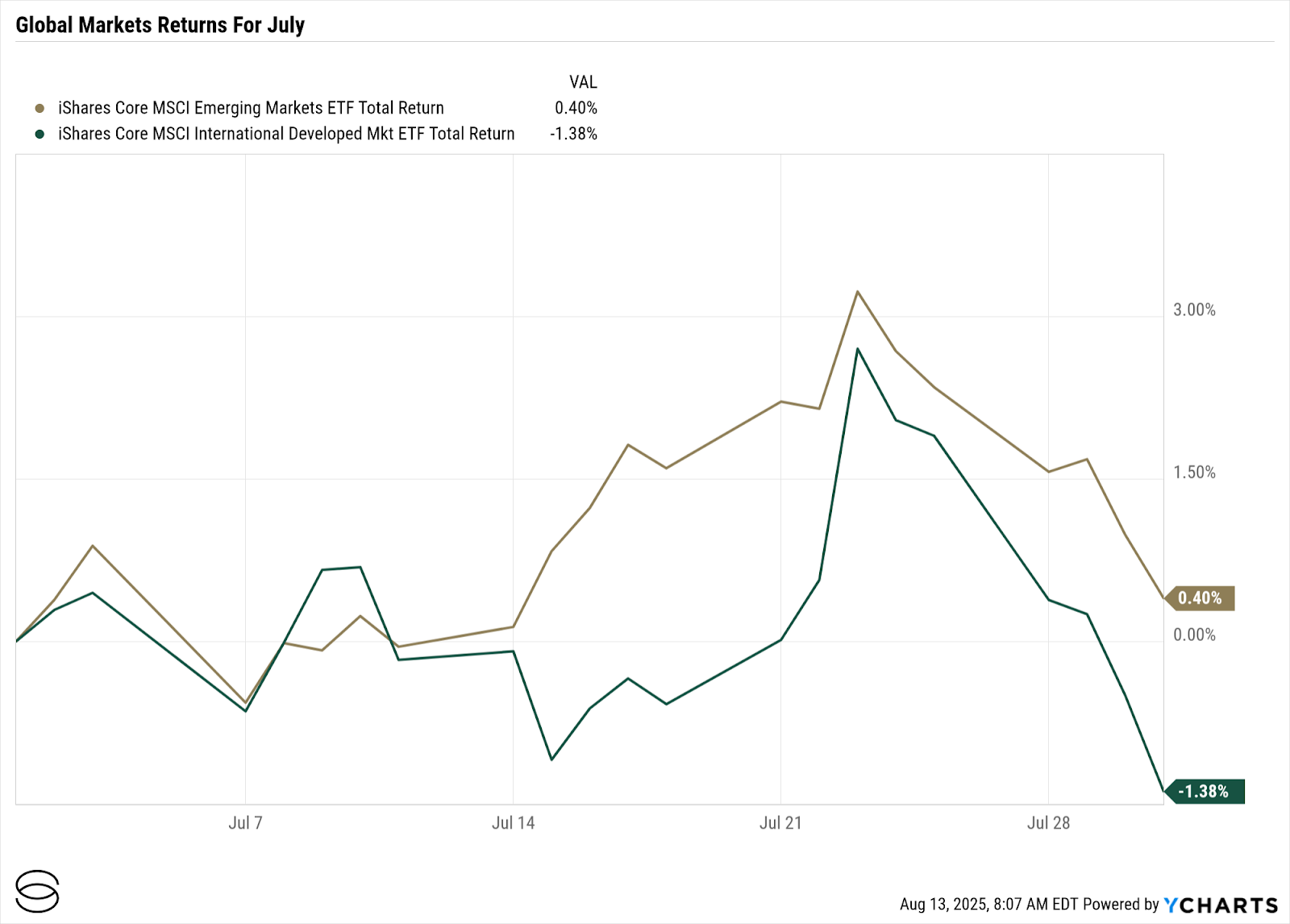
July 2025 Global Markets Recap
July Highlights
- U.S. markets gained as strong earnings
- Trade tensions eased with new U.S. deals lowering escalation risks
- Emerging markets edged higher, developed markets slipped
US Markets
US Equity markets advanced in the second quarter, supported by a stronger-than-expected corporate earnings season. Nearly four out of five S&P 500 companies that have reported thus far have exceeded analysts’ forecasts for both earnings and revenue growth—an outcome that surpasses the historical beat rate. This resilience has helped reassure investors that recent political uncertainty has, at least for now, had only a limited impact on corporate fundamentals.
Performance varied across major U.S. equity benchmarks. The Nasdaq Composite led with a 4.55% gain, driven largely by strength in technology and growth-oriented sectors. The S&P 500 added 2.28%, while the small-cap Russell 2000 rose a modest 0.69%. In contrast, the Dow Jones Industrial Average slipped 0.82%, reflecting underperformance among more value-oriented and cyclical constituents.
The “Magnificent Seven” continued to deliver outsized results, with aggregate earnings growth of roughly 17%, compared to about 4% for the broader index. Technology companies, in particular, stood out: revenue growth for the sector is running near 14%, double the pace of the rest of the market. These results underscore the ongoing leadership of large-cap growth names and the resilience of key segments of the U.S. economy.


US Economy
In July, markets were buoyed by greater policy clarity following several U.S. trade agreements and the passage of the One Big Beautiful Bill Act (OBBBA). These developments supported risk sentiment, though the ultimate economic impact—particularly from the reimposition of reciprocal tariffs—remains uncertain.
Early in the month, the U.S. finalized a new trade agreement with Vietnam, maintaining a 20% tariff on direct imports and a 40% rate on goods routed through Vietnam from third countries1. Later in the month, agreements with Japan and the European Union (EU) were announced, setting most import tariffs, including those on automobiles, at 15%. While these rates are notably higher than the 2.4% average prior to the Trump administration, equity markets responded positively to the reduced risk of a renewed and escalating trade conflict2.
The Federal Reserve held interest rates steady for a fifth consecutive meeting in July, with policymakers divided over the timing for resuming rate cuts after an extended pause. The decision comes amid growing political pressure, as President Trump has intensified calls for lower borrowing costs following additional fiscal spending. For the Fed, the full economic implications of the new tariff structures and fiscal measures may not become clear until autumn.
International Markets
In July, global equity markets moved in different directions following earlier policy-driven rallies. Emerging markets delivered a modest gain of roughly +0.40%, aided by improving economic signals in parts of Asia—most notably in China—and renewed strength in technology sectors. Several economies also demonstrated resilience to ongoing U.S. tariff pressures: India is broadening its export footprint beyond the U.S., Mexico has benefited from delayed tariff implementation and constructive trade diplomacy, and Brazil is deploying fiscal support while pursuing recourse through the WTO3.
Developed international markets, by contrast, declined about –1.38%, as softer economic data in Europe and Japan, currency headwinds, and ongoing geopolitical uncertainty outweighed the potential benefits from recent trade agreements. Sentiment in parts of Europe also softened amid growing public opposition to U.S. trade policy, adding another layer of caution for investors.



Mike has been in the wealth management industry for 10 years, beginning his career at BNY Mellon’s Silicon Valley office. There, he learned the intricacies of wealth management and discovered his passion for helping families achieve their financial goals. He later became a Portfolio Manager at an ultra-high net worth RIA in Boston, where he honed his skills in developing custom investment strategies for clients. Inspired by Savvy’s mission to bring a tech-focused energy to the wealth management industry, Mike joined the firm in July 2022 to drive the launch and continued evolution of their advisory capabilities. At Savvy, Mike has played a key role in developing, launching, and managing the in-house investment solution, Savvy Wealth Investment Management (“SWIM”). He also leads Savvy’s Client Experience Team, partnering closely with associates and advisors and aimed at producing best-in-class services for their clients. Mike is a graduate of Northeastern University and holds his Certified Financial Planner™ (CFP®) designation. He resides in New York with his wife, Alex, and their golden retriever, Bondi.

David Gao is an investment professional at Savvy with deep expertise in portfolio management and trading strategies. He graduated with honors from the University of Utah’s David Eccles School of Business, earning dual degrees in Finance and Economics. Before joining Savvy Wealth, David led trading operations exceeding $1 billion at Campbell Wealth Management, where he also designed and implemented an options covered call strategy. At United Capital Family Office, he played a key role in portfolio allocation, leveraging proprietary algorithms and advanced risk management techniques. He began his career at Goldman Sachs, where he built a strong foundation in investment research and analytics.

Material prepared herein has been created for informational purposes only and should not be considered investment advice or a recommendation. Information was obtained from sources believed to be reliable but was not verified for accuracy.
Savvy Wealth Inc. is a technology company. Savvy Advisors, Inc. is an SEC registered investment advisor. For purposes of this article, Savvy Wealth and Savvy Advisors together are referred to as “Savvy”. All advisory services are offered through Savvy Advisors, while technology is offered through Savvy Wealth. The views and opinions expressed herein are those of the speakers and authors, and do not necessarily reflect the views or positions of Savvy Advisors.
Sources:
2. https://www.reuters.com/business/us-eu-avert-trade-war-with-15-tariff-deal-2025-07-28/
3. https://www.reuters.com/world/americas/brazil-provide-56-billion-help-exporters-navigate-us-tariffs-2025-08-12/?utm_source=chatgpt.com



.webp)


